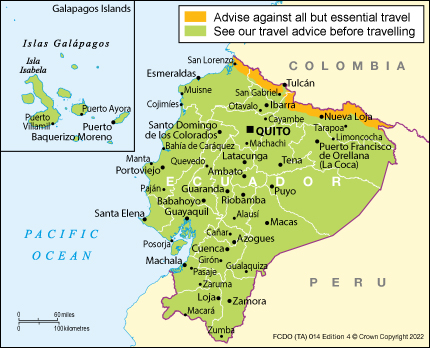Ecuador
Summary

The Foreign, Commonwealth and Development Office (FCDO) advises against all but essential travel to areas within 20km of the Ecuadorean border with Colombia, except:
- the El Angel ecological reserve in Carchi province
- the Rumachica border crossing, the town of Tulcan, and the Pan American Highway in Carchi province
Before you travel, check the ‘Entry requirements’ section for Ecuador’s current entry restrictions and requirements. These may change with little warning. Monitor this advice for the latest updates and stay in contact with your travel provider.
If you plan to pass through another country to return to the UK, check the travel advice for the country you’re transiting.
Travelling to areas within 20km of the Ecuadorean border with Colombia to which the FCDO advises against all but essential travel to carries significant risks due to the presence of organised crime linked to the production and trafficking of drugs.
Starting on 27 October, there will be regulardaily power cuts nationwide.nationwide (four hours in the highlands and amazon area, and three hours on the coast and Galapagos Islands). Each electrical company, from each city/town, is responsible for organising the calendar of power cut times. The information on these times can be found on the official social media channels (X, Facebook and Instagram) of theeach electrical company and other official websites.
On 25 October, the heavy road transport association (CONFETRAPE) announced strikes and demonstrations across several provinces, due to the insecurity they face on the roads. These started on 26 October. Please consider this when making travel plans and check the ECU911 official page for road closures.
On 9 August a presidential candidate was assassinated following a campaign rally in Quito.QuitoExtra Extra military personnel are deployed throughout the country to support the Ecuadorean national police to guarantee the security of citizens. British nationals are advised to stay away from large gatherings or political rallies, and to be aware of additional presence of police and army in the streets. See Safety and security.
Peaceful elections were held on 15 October and a new President elected. He will likely take power in late November 2023.
Since March 2023 there have been a series of small explosions and also false bomb threats in both Quito and Guayaquil, linked to organised crime. The explosions resulted in some property damage, but no injuries or deaths. Some threats have been detonated by security forces in controlled explosions. Should an incident occur near where you are, follow the instructions of police and local authorities..
The security situation in the areas of Esmeraldas, Carchi and Sucumbios provinces, which lie outside the 20km border zone can change quickly. If you are travelling to these areas, including Cuyabeno, the Napo river, and the El Angel ecological reserve where there are a number of eco lodges, you should take local advice, pay close attention to warnings issued by the Ecuadorean authorities and be particularly cautious and vigilant. Illegal armed groups and criminal gangs are present in these areas. Travelling during daylight hours and with a reputable operator with official guides, emergency plans and good communication systems will reduce risks. Some lodges are a long distance from the nearest major hospital and helicopter evacuation may be necessary in an emergency. See Local travel
It is more important than ever to get travel insurance and check it provides sufficient cover. See the FCDO’s guidance on foreign travel insurance.
Around 20,700 British nationals visited Ecuador in 2022. Most visits are trouble free.
Terrorist attacks in Ecuador cannot be ruled out. See Terrorism
Ecuador is situated in an area of intense seismic activity. There is a high risk of earthquakes, volcanic eruptions and tsunamis. You should make sure you are aware of the risks and are familiar with the relevant safety and evacuation procedures. In the event of a natural disaster, you should monitor official channels – the Ecuadorean National Geophysical Institute and the National Service for Risk and Emergency Management (both Spanish only) – and follow the advice of the local authorities. See Natural disasters
Cases of armed robbery are increasing and petty crime is common. See Crime
UK health authorities have classified Ecuador as having a risk of Zika virus transmission. For more information and advice, visit the website of the National Travel Health Network and Centre website.
If you’re abroad and you need emergency help from the UK government, contact the nearest British embassy, consulate or high commission. Consular support may be limited in parts of Ecuador.
The Overseas Business Risk service offers information and advice for British companies operating overseas on how to manage political, economic, and business security-related risks.
Altitude sickness is a risk in parts of Ecuador, including Quito. See Health.